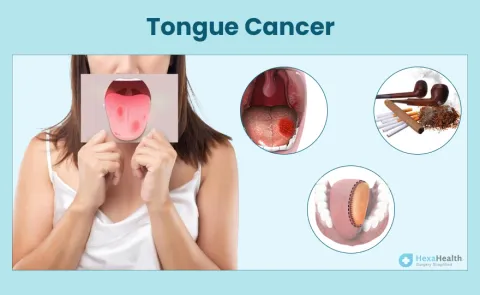The treatment for tongue cancer will depend on the cancer stage, location, and the patient’s overall health and preferences. Treatment for tongue cancer typically involves a combination of different approaches, including surgery, radiation therapy, and chemotherapy.
Here are some common tongue cancer treatment options:
Surgery: Tongue cancer surgery is often the best way to remove the cancerous tissue in the tongue. The surgeon might also remove nearby lymph nodes if the cancer has spread. In some cases, partial or complete tongue removal may be necessary with a glossectomy procedure.
The patient may need reconstruction surgery if a large tongue piece is removed.
During the reconstruction surgery, the doctor takes a piece of skin or tissue from another body part to rebuild the tongue.
The goal of glossectomy and reconstruction surgery is to remove the tongue cancer while damaging as little of the mouth as possible.
However, glossectomy may cause some side effects, such as problems with speaking, eating, breathing, and swallowing.
Radiation Therapy: It uses high-energy beams to kill cancer cells. The treatment may be used alone or in combination with surgery or chemotherapy.
Chemotherapy: The treatment uses drugs to kill cancer cells. It may be used alone or with radiation therapy or tongue cancer surgery.
Targeted Therapy: It is a newer approach that targets specific molecules involved in cancer growth. It can be used in cases where the cancer has certain genetic mutations. Targeted therapy drugs work by interfering with the signaling pathways that promote cancer growth.
Immunotherapy: It uses the body's immune system to fight cancer. It works by stimulating the immune system or by using drugs that specifically target and block proteins that prevent the immune system from recognizing and attacking cancer cells. Immunotherapy may be used in advanced cases of tongue cancer or in cases where other treatments have not been effective.
Cost of Tongue Cancer Treatment
The cost of tongue cancer treatment is influenced by several factors including the stage of the cancer, the treatment method, the patient’s age, the patient’s comorbidities, location of the hospital, the type of the hospital or clinic, doctor’s expertise, and much more.
To know the cost of the treatment method, the patient must consult with his/her doctor. The below table provides an approximate cost value for various tongue cancer treatment methods.
| Surgery Name |
Surgery Cost |
| Tongue Cancer Surgery |
|
| Radiation Therapy |
₹60,000 to ₹2,00,000 |
| Chemotherapy |
₹75,000 to ₹2,50,000 |
| Targeted Therapy |
₹80,000 to ₹2,25,000
|
| Immunotherapy |
₹80,000 to ₹2,25,000 |
Tongue Cancer Survival Rate
The survival rate represents the likelihood of a person with tongue cancer still being alive five years after the diagnosis compared with someone without tongue cancer. The survival rate for tongue cancer varies depending on several factors, including the cancer stage, the tumour’s location, and the patient’s overall health. However, generally, the disease has quite a high five-year survival rate, which is as follows:
| Stage |
5-year Survival Rate |
| Localised (not spread beyond the tongue) |
83%
|
| Regional (spread to lymph nodes) |
69%
|
| Distant (spread to other body parts) |
41%
|

























